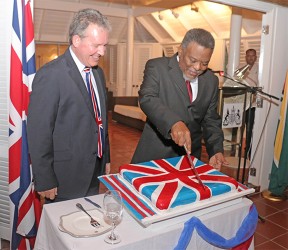A stain on Guyana’s international standing was how UK High Commissioner Andrew Ayre described the withholding of long-awaited local government elections by the Guyana Government.
In the presence of Prime Minister Sam Hinds, Ayre delivered his stinging rebuke at a reception at his residence in honour of the birthday of Queen Elizabeth II.
Ayre was the latest of Western envoys to flay the government over local government elections. Envoys from the US, Canada and theEuropean Union have also spoken out on this subject in recent months.

The UK High Commis-sioner also lambasted the reasons given by the government for not holding the elections as breaches of Guyana’s constitution and a violation of the Commonwealth Charter.
“Ladies and Gentlemen: In years past, I have rightly reflected on the progress Guyana has made. But those democratic gains are under threat. The decision not to have local elections is a stain on Guyana’s international standing. Not only are the reasons given a clear breach of Guyana’s constitution. They are also a clear breach of the Commonwealth charter. The UK again calls on Guyana’s Government to deliver now what it is supposed to do every three years and what was in the manifestos of all three parties ahead of the 2011 elections: local elections”, Ayre declared.
When it was his turn to respond on Guyana’s behalf Hinds said: “I would like to keep this issue local…I am confident that in time our differing views on this matter will be resolved.”
The government has come under pressure to name a date for the elections and has provided a series of excuses which have all been castigated by critics. The first was that the Guyana Elections Commission was not ready. This was swiftly debunked by GECOM. The second was that Guyanese needed to be educated about the local government elections and until this was done it would not be appropriate to hold the polls. This excuse has been bandied about by the General Secretary of the PPP, Clement Rohee and the Minister of Local Government Norman Whittaker. In recent weeks, President Donald Ramotar had provided other excuses. He cited the present political stalemate, the government’s lack of a majority in Parliament and the need to hold in reserve the possibility of calling general elections if the fallout from the stalemate on the anti-money laundering (AML) bill hits the country hard.
Ayre also addressed the AML bill last night. He said that the likely blacklisting of Guyana by the Financial Action Task Force can reverse many of the hard-won gains made by the country.
“It was avoidable, and might yet still be avoided. But to do so needs immediate action to adopt and implement the numerous recommendations that FATF requires of us all, including carrying out investigations into complex financial crime”, Ayre stated.
He added that the UK, US and Canada have worked hard over the past 18 months to assist including through offers of training and mentoring. I do not know why this work, which requires no new legislation, has not been done. The UK also calls upon the political parties to adopt, without further delay, the revised AML/CFT bill. The time for playing politics was over months ago”.
Hinds in his reply said “I agree wholeheartedly with you that the legislation must be passed…you are speaking to the converted”.
The AML/CFT bill remains mired in tortuous discussions among the three groups in Parliament with no sign of progress on the various demands that the opposition have made. The government needs support from one of the two opposition parties to have the bill passed. Critics of the PPP/C government have pointed out that the amended bill could have been easily passed in the last years of the Bharrat Jagdeo administration when the PPP/C held a comfortable majority in Parliament.
Ayre, whose tour of duty is coming to an end, said that despite the challenges he remained optimistic about Guyana’s long-term future and the UK’s role in it.
“This is a country of enormous potential with a talented, in some cases brilliant, population. The key to Guyana’s development is to provide the conditions required to retain this talent, rather than have it develop and enrich other people’s countries, including my own”.
Earlier in his address he sounded a defiant note on the Falkland Islands over which Britain and Argentina fought a bloody war in 1982.
“In case there is any doubt, let me dispel it now: the Falklands will remain an Overseas Territory of the United Kingdom. It has never been, and will never be, part of Argentina unless the Falkland Islanders themselves say they want that. That’s what self-determination is; and, it’s a cornerstone of the UN Charter”, he asserted.
Two years ago, Guyana did an about-face on this matter and announced support for Argentina’s claim to what Buenos Aires calls Las Malvinas.





